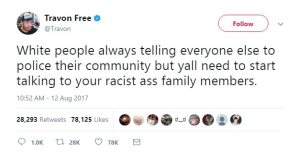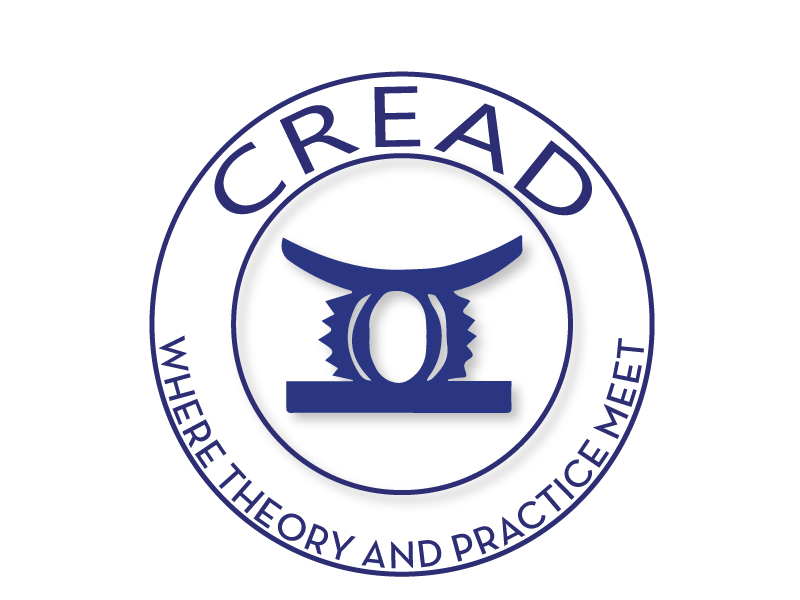I woke up Sunday morning in a cabin in northern Minnesota, safely nestled on a lake, less than a half day’s drive from the Canadian border. The morning news was on and nearly all of the 21 members of my extended family who were gathered for our yearly reunion, quieted to hear the details of the act of White nationalist terrorism that took place in Charlottesville the day before.
Some expressed outrage (this side of the family “would have voted for Obama for a third time”) but most remained silently disturbed, brows furrowed in an expression of pale despair as 45 read a statement condemning the violence that occurred “on all sides.”
As I looked around at the 4 generations gathered by the television (all White) and glanced back at the outraged White crowd on the screen, an understanding bubbled up to my consciousness.
Those are our people.

In that crowd of violent White nationalists, I recognized the faces on the screen. These men and women could be my cousins, aunts or uncles. If I were to walk among them in a public place without knowing who they are or what they believe, I would likely not feel unsafe.
And this is what brings me to my understanding of what we as White folks must begin to take on as our loved ones of color are increasingly threatened in a White supremacist state, newly emboldened with direct support from the highest seat of our government.
We must be willing to acknowledge that White supremacy is a kind of belonging that does not by any means, require white skin for inclusion, but that does grant automatic lifetime membership for those who look the part.

This is painful to admit.
And when I’m working with other White folks, I usually find this to be one of the first hurdles; the “but not me…” intellectual rejection of the fact that White supremacy loves us and we will always have a home in its arms.
What do anti-racist White folks do with this acceptance?
What do we do when we recognize and acknowledge that these are our people?
I struggle with the idea that I have the right answer for anything. Part of the personal work of undoing my own White supremacy is moving away from the idea that I know what’s best for people and that I have all the answers. Additionally, the only thing I can truly say I have expertise on is my own failures in constructing my anti-racist identity.

But with that said, White silence is proof of White supremacy’s embrace and our comfort within it.
So in addition to the obvious, (i.e. participation in local activist events that pop up in the coming days- a nationwide list of actions can be found here,) I’ll tell you what I’m thinking about and planning for and how I hope to act my way out of despair’s paralysis.
We need to reach out to our people so that they will reach out to theirs.

I drove to town for cell service and called my dad right away. We talked about what happened and I asked him how he was going to talk about it with my much younger sisters. I told him I would call our family in North Carolina.
My southern uncle was a police officer for nearly 30 years. When White violence occurs, I reach out to him. Our relationship has grown and deepened as we construct an anti-racist family identity together. As Black and Brown bodies continue to be assaulted with impunity, I want to know that my tribe is talking about it, engaging and acting.

We need to participate in experiences of Black and Brown truth-telling and express gratitude for Black and Brown truth.
Dr. David Ragland of the Truth Telling Project of Ferguson has initiated a decade of truth telling and has asked White allies to aid in the process of healing for people of color by engaging in formal and informal listening for liberation. TTP has organized a truth telling event on August 17th that I’ll be a part of. We can engage with organizations like the Truth Telling Project and the Movement for Black Lives and organize truth telling and transformative and restorative justice events in our communities. We can bring members of our White tribes to these events with the understanding that we are there to be active(ist) listeners.

For those of us participating in local protests or organized action events, the Catalyst Project has just released a new pamphlet, “A Troublemakers’ Guide: Principles for Racial Justice Activists in the Face of State Repression.” This pamphlet gives practical information about how the state represses activist movements and offers solid guidelines for White activists around issues of non-compliance, which is urgent for those of us who work in schools where young people are increasingly at risk for arrest or deportation.

Finally, I am considering my long-term plans as an educator. I need to be working in White spaces in which this deeply rooted historical racism is reproducing itself in schools and institutions. How am I creating inroads toward working in school districts where young people have grown up around revered statues of Robert E. Lee? How can I extend my reach as a White educator?
How do we as White people truly start to take responsibility for our people?
I don’t know what the answer is but as a White anti-racist, this is my line of inquiry as I move forward. Every good teacher knows a line of inquiry drives deep exploration of a given topic, and a good line of inquiry is divergent- it leads to multiple, expanding answers. I reached out to some family today and learned about extended family who are teachers in Alabama. I’m thinking I’ll start there. I can’t say how it will go but it’s a start. Because when I was a young teacher, thinking I was the shit for some reason or another somebody wise told me;
“You think you got this. You don’t got this.”
For my work as an anti-racist this may have been the best advice I’ve ever gotten. The minute I think I’ve done it, that I’ve made my contribution, that the work is complete, I’m nestled back into White supremacy’s embrace, tucked in for the night, choosing safety over life.
Not this time.
These are my people and I need to be accountable for them.

Erin Dunlevy is the Founder and Director at Restorative Practice NYC, a Restorative Justice Trainer and Equity Coach with over 15 years of professional experience in NYC public schools. Erin works to develop strategic solutions around issues of critical consciousness and anti-racism in schools. Particular areas of focus include developing a restorative model for critical consciousness, anti-bias strategies and examining the impact of race, power, and privilege in schools and professional settings. Her work has also focused on developing and implementing strategies for addressing equity issues within classrooms, specifically as an advocate for Culturally Responsive Pedagogy, Native Language Arts Education and restorative circles in core content classes. Currently Erin works for the NYC Restorative Justice Pilot Initiative and the NYPD Warning Card Pilot Initiative and and is a member of the Advisory Board of the Truth Telling Project of Ferguson.


Thank you. I am eager to hear details of these conversations about whiteness, belonging, and anti-racism, Erin. Your training might leave you in a position of more productive anti-racism outcomes than my attempts with family, which have ended more often in defensiveness.
LikeLike
Hey Sara, thanks for your thoughtful comment. I use a values-based approach to my conversations with my family members which I think has allowed for more transformation than conflict. I’d be really happy to talk to you about that in more detail if you’d like? Feel free to shoot me an email at restorativepracticenyc@gmail.com
LikeLike